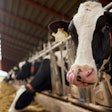
U.S. consumers have expressed cautious support for the use of artificial intelligence (AI) in food and agriculture production, but trust gaps remain that could challenge adoption, according to Purdue University's August 2025 Consumer Food Insights report.
The survey, which consists of more than 1,200 adults, found that while 92 percent of consumers report at least slight familiarity with AI, acceptance of AI in food systems varies by application and age group.
Majority support with exceptions
The study shows consumer support for efficiency-focused AI applications. Support was highest for AI that reduces food waste on farms (72 percent somewhat or greatly support), reduces pesticide use through precise application (70 percent support) and helps grocery stores prevent stockouts (66 percent support).
However, support drops for AI applications affecting labor. Only 44 percent support AI that reduces reliance on labor in harvesting.
Consumer trust in AI for food system decisions remains moderate across categories, with food safety and nutrition advice earning the highest confidence levels. Approximately 15 percent of respondents consistently report having no trust in AI for key food system tasks.
Transparency and age cause challenges
The study reveals that transparency is significant for broader AI acceptance, as 64 percent of consumers consider disclosure of AI use in food production "very" or "extremely" important.
When asked about choosing AI-assisted food products at equivalent prices, 23 percent said they would be unlikely to purchase those products and 45 percent indicated they would likely select AI-assisted options.
Age also showed to be an important factor in AI acceptance, as 30 percent of consumers aged 65 and above said they would be unlikely to purchase AI-assisted food products, compared to 19 percent of 18-34 year-olds.
Follow-up questions in the study revealed that older consumers' skepticism stems largely from uncertainty about what "AI-assisted" means. Among consumers unlikely to choose AI-assisted products, the top concerns were food safety (70 percent cited this concern), preference for traditional farming methods (60 percent) and fears about negative impacts on food quality or naturalness (57 percent).
Education and transparency are needed
Even though consumer sentiment leans positive overall for AI integration into food production, the skepticism among some consumers suggests companies will need to improve transparency and education strategies.
Because the food and agriculture industries are increasingly relying on AI, bridging the trust gap through outreach and clearer communication about its applications will be essential for successful adoption and consumer acceptance.
Hopefully, implementation of AI in food systems won’t get ahead of consumer education efforts.



















